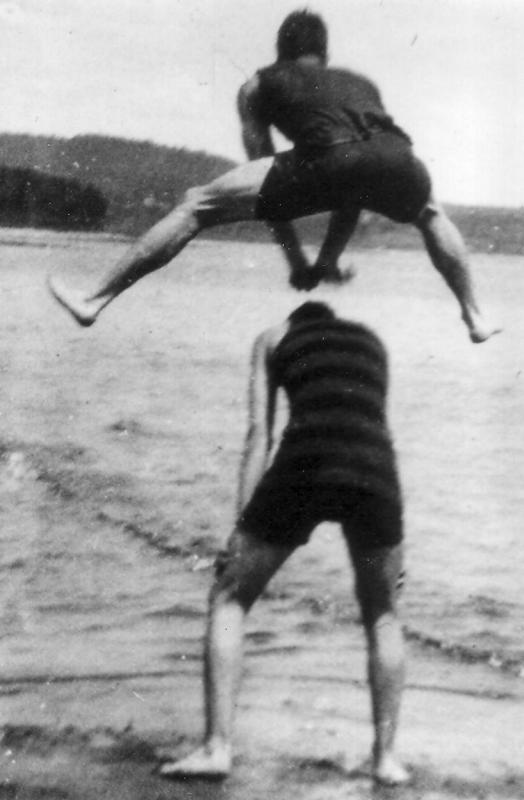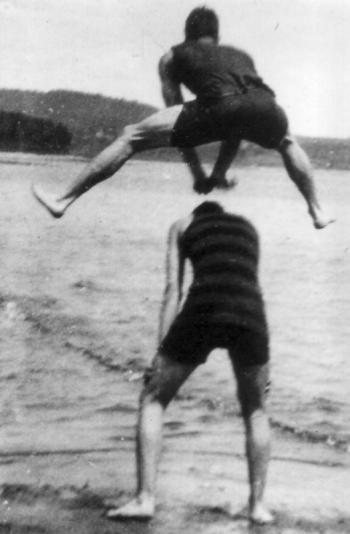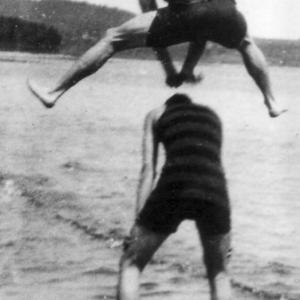This Week in Lincolnville: Treasures found in dusty old boxes
 This wonderful photo, taken on Lincolnville Beach back when men wore bathing suits like this, was in an album that found its way to the Historical Society one day several years ago. All the photos were taken at or near today’s Spouter Inn, then a private summer cottage called the Fir Wigwam.
Photo courtesy Lincolnville Historical Society
This wonderful photo, taken on Lincolnville Beach back when men wore bathing suits like this, was in an album that found its way to the Historical Society one day several years ago. All the photos were taken at or near today’s Spouter Inn, then a private summer cottage called the Fir Wigwam.
Photo courtesy Lincolnville Historical Society
 This wonderful photo, taken on Lincolnville Beach back when men wore bathing suits like this, was in an album that found its way to the Historical Society one day several years ago. All the photos were taken at or near today’s Spouter Inn, then a private summer cottage called the Fir Wigwam.
Photo courtesy Lincolnville Historical Society
This wonderful photo, taken on Lincolnville Beach back when men wore bathing suits like this, was in an album that found its way to the Historical Society one day several years ago. All the photos were taken at or near today’s Spouter Inn, then a private summer cottage called the Fir Wigwam.
Photo courtesy Lincolnville Historical Society
Very few of us get through life without collecting stuff. Not the material goods we amass, and goodness knows, most of us have enough of that, but the memorabilia, bits of paper, souvenirs, letters, certificates — the ephemera. Do you still have the ribbons you won at your sixth grade field day? How about the plastic trophy for “Best Improved Band Member”? A certain son of mine just last year parted for good from the cast he wore on his broken arm the year he was 12. Last summer I spent weeks digging through the loft of our barn, pulling out box after box holding reminders of our three sons’ childhoods.
Perhaps you’re still young enough that your own personal ephemera still resides with your parents. Lucky you. When/if you’re as old as I am, their stuff probably lives with you. Of course, when your parents die you sell everything of value that you can’t use: their house, car, furniture, etc., and you keep the mementoes that remind you of them. My dad died 31 years ago this month, and his hat still hangs on our kitchen coat rack, although I have to confess, I finally nailed it there because it kept falling off. I realize that kind of kills the spontaneity of the thing, as in, “Dad hung it up there the last time he wore it and we never touched it,” but it still comforts us when we spot it hanging there.
My mother’s glass sugar bowl lives a precarious, but protected existence on the side of our woodstove. We use it every day. I handle it with care, always aware that a single mishap will shatter it, and even rehearse my reaction the day one of our grandchildren accidentally drops it. “No big deal,” I’ll say nonchalantly, as I sweep up the pieces, hiding the tears that will inevitably spring to my eyes.
However, these things aren’t the ephemera. That generally comes in battered cardboard boxes, which have spent years on the floor of the attic, in the back of a closet, or worst case, in a damp cellar. Even if someone had the foresight to move the stuff into a sterile plastic bin with a tight top, the years spent in the cardboard box have done their damage.
I love these boxes. Small town historical societies are a favorite repository for dusty boxes full of ephemera. The Lincolnville Historical Society’s Schoolhouse Museum has been given its share of them, and when they come in, Connie Parker, the museum’s director, and I break out in wide grins. We’ve learned what to expect: Everything is dusty; it smells musty. You don’t really want to handle it. The papers are brown and stained: foxing, according to Wikipedia, “is an age-related process of deterioration that causes spots and browning on old paper documents, such as books, postage stamps and certificates.” It’s a perfect description of the contents you’ll find in these boxes left behind by our departed. And we never know what’s inside.
We’ve never found anything valuable — no hidden jewelry or rare book yet. What we do find though, are glimpses into the lives of people long dead, and in many cases, forgotten, even by their descendants, in all but name. But as we sift through the contents of a dusty old box, we pull out scraps of paper with penciled recipes, or a note about money owed, or a receipt for a long-ago purchase — things handled, business attended to. We find day books, the little notebooks workmen kept in their overall pocket, to record the hours they worked each day. Sometimes they’ve written their name on it, but often not. After all, the guy knew it belonged to him! Sometimes just the month and day is recorded with no year. Store account books can be a treasure, with their list of customers and generally a better record of dates. Even when the storekeeper’s name isn’t there, we can often guess where it was by who was shopping there. Connie and I generally recognize most Lincolnville names and know where they lived.
So what did we find in a recent dusty box pulled out from under the eaves in a Lincolnville house?
Murray’s English Grammar “designed for the Younger Class of Learners”, dated 1816
A Practical System of Modern Geography, dated 1842
The Gentlemen and Ladies’ Pocket Dictionary, dated 1831
Several pocket Bibles, various dates
A folding chart of Veterinary Practice & Animal Diseases, dated 1848
Echoes from Zion, a hymn book “for the Prayer Meeting, Camp Meeting, Family Circle, dated 1874
Assorted grammar school textbooks dating from the 1890s
A wall calendar from R. Scott Knight’s store, 1954
A Third Degree Masonry certificate in King David’s Lodge, dated 1869
A potato masher of a style I’d never seen
A school child’s wooden ruler
Nine play scripts
Assorted Camden Heralds, dated 1941 through 1973
A child’s English composition book
A Lincolnville Town Band photo (which we already have) with all the band members identified on the back (which we don’t have). And lots more!
CALENDAR
MONDAY, MAR. 28
Nomination papers available, Town Office
Selectmen meet, 6 p.m., Town Office
WEDNESDAY, MAR. 30
Planning Board, 7 p.m., Town Office
THURSDAY, MAR. 12
Free Soup Café, noon-1 p.m., Community Building, 18 Searsmont Road
FRIDAY, MARCH 13
Midcoast Music Together, 11 a.m., Lincolnville Library
Every week:
AA meetings, Tuesdays & Fridays at 12:15 p.m., Wednesdays & Sundays at 6 p.m.,United Christian Church
Lincolnville Community Library, open Tuesdays, 4-7, Wednesdays, 2-7, Fridays and Saturdays, 9 a.m.-noon. For information call 763-4343.
Soup Café, every Thursday, noon—1p.m., Community Building, Sponsored by United Christian Church. Free, though donations to the Good Neighbor Fund are appreciated
Schoolhouse Museum open by appointment only until June 2015: call Connie Parker, 789-5984
And what do we do with them? Each piece of paper or object is accessioned, which means accepted into our collection. We give it a number, e.g., LHS 2016.1, indicating the first item accessioned in the year 2016. Then we either scan, if it’s a document, or photograph objects, and enter the image into the digital file that holds our whole collection. The program we use, Past Perfect, allows us to enter the donor’s name, the condition of the item, any relevant information we have on it, its size, and where the actual item is stored. Original documents are kept in archival boxes, each box numbered and kept on a numbered shelf. Those numbers are recorded in the digital file. Objects are put on display in the Museum, or stored in bins, boxes or drawers.
Newspaper clippings are a special case. People used to save them, pasting them into scrapbooks, or folding them up in an envelope or drawer. Often they were obituaries of friends or family. It’s hard to imagine in this day of everything saved on the Cloud, but the information in those clippings virtually disappears once the newspaper does; fewer and fewer libraries keep old papers. Some are digitized, but most aren’t. So we look carefully at the old newspapers in the dusty boxes. Connie keeps a notebook at the Museum of these obituaries of Lincolnville people, and they contain lots of information on family members, etc. If, however, the paper is too fragile and falling apart, we’ll scan it, print it for the notebook, then discard the clipping.
Given the helter skelter way the stuff often comes to us, identifying where we’ve put all these documents and objects is very important to us. When, say, the donor comes in to show his kids the family collection, we want to be able to go right to it. A single item is numbered sequentially, but when boxes come from the same source we’ll give it a collection number and then sub-numbers for each of the individual items that were in the boxes, so LHS 2016.1.1-?
Sometimes one of these boxes of ephemera contain real gems, items that reveal a window into the past. One was a little shoebox I was given some 25 or more years ago, a box with 169 letters between a Lincolnville woman and her mother, written between 1870-1884. Connie and I have transcribed them all. They’ll be available on our website soon. The other “find”, Ralph Richards’ diaries spanning 1908-1966, were spotted on Ebay (not in a dusty box, but close enough) by Jackie Watts, and the LHS was able to buy them. You can read Ralph’s first 5-Year Diary, 1908-1912, on the website.
Town Office
The second half of Lincolnville property taxes are due at the Town Office no later than the close of business April 6. You can also pay them online though there’s a fee for this.
If you can answer ‘yes’ to the following questions, you can quality for the Homestead Exemption.
1. Are you a permanent resident of the State of Maine?
2. Have you owned a homestead in Maine for the past 12 months?
3. Do you declare the homestead in this municipality is your permanent residence and the only property for which you have claimed a homestead property tax exemption? (Summer camps, vacation homes and second residences do not qualify)
The deadline to apply for the Homestead Exemption is April 1. If you already receive it, you don’t have to apply again. Get the application here or at the Town Office.
Lincolnville Central School
There’s a good article, “What are the risks of watching too much television from a young age”, in this week’s Lynx Newsletter.
Library News
Jessica Day, of Midcoast Music Together, will offer the fourth in a series of free family music programs Friday, April 1, at 11 a.m. at the Lincolnville Community Library. Families with children from newborn to age 5 are invited to come sing, move, shake and explore musical instruments together. Sheila says there were 45 parents and children at the last session. The series is sponsored by Bangor Savings Bank. For more information, call 763-4343 or email.
Scams
Apparently, there have been quite a few scams turning up in the Midcoast, both phone and online. It seems to me that one good rule of thumb for all of us is not to send money or give information to anyone who solicits it from us. Waldo County Triad, which sends out a regular newsletter with information of particular interest of seniors, addresses the scam issue.The latest newsletter mentions the following scams which have turned up in our area: Jackpot Scam, Publishers Clearing House Scam, Vehicle Warranty Scam, IRS Scam, Grieving Widow Scam, Toll Free Number Scam, High School Diploma Scam, and Fake Social Security Email. For details on these scams, see the spring TRIAD newsletter. If you don’t receive it, call 1-866-426-7555 or email and ask to be put on their mailing list.
Event Date
Address
United States


























